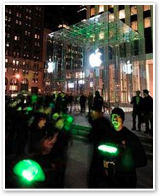
ArsTechnica: Mary E Tyler Admits Greenpeace a Fraud
In its misinformation campaign to vilify Apple in environmental issues, Greenpeace has employed the maxim credited to Abraham Lincoln: “You can fool some of the people all of the time, and all of the people some of the time, but you can not fool all of the people all of the time.”
Greenpeace doesn’t have to fool everyone, it only has to fool enough people to create the general impression that Apple’s customers bear a weighty ‘green guilt’ that can best be assuaged by... donating money to Greenpeace.
RoughlyDrafted presented a series of articles that factually disputed Greenpeace’s claims and demonstrated that the group was willfully publishing bad data and advertising presumptions it knew were not accurate:
Myth 2: Greenpeace Toxic Apple Panic even ranked the Greenpeace campaign claims among the top ten Apple myths of 2006 for the group’s intentionally tainting headlines with misleading tales about Apple, just to get donations and free publicity for itself.
Considering that Greenpeace will no doubt be panhandling at Macworld, here’s a four step plan for recovering from a Greenpeace brainwashing, following the experience of ArsTechnica’s Mary E Tyler.
Given the general lack of skepticism in the mainstream media, it was not surprising to read Tyler’s impassioned regurgitation of Greenpeace press release bullet points in Greenpeace's latest Apple stunt: if you can't beat em, light 'em back on December 18.
Tyler sidestepped the issue of Greenpeace’s accuracy or motives to repeat the group’s basic premise in the form of an emotional plea: “can Apple make a business case for ‘going green?’”
She might as well have written, “who cares if the children are actually in danger from Wi-Fi wireless networks; the real question to ask yourself is... CAN’T WE THINK OF THE CHILDREN!??”
After cooking up a buffet of red herrings, Tyler asked in closing, “Greenpeace may be a bunch of grandstanding nuts, but if they don't call Apple on this, who will?”
Greenpeace probably wasn’t insulted by that line, because the group doesn’t seem to be worried about its reputation. However, Tyler’s article served to do exactly what Greenpeace intended its stunt to accomplish: instill fear, uncertainly and doubt about Apple’s environmental record, in order to direct attention to itself as the savior.
Step Two: Consider the Facts
If Tyler had done the most basic research before writing her article, she might have come across the extensive criticism of Greenpeace’s Toxic Apple campaign, which is even in Wikipedia.
Greenpeace has even found RoughlyDrafted’s criticism damning enough to demand an official response, both on its website and in Wikiality. Rather than actually defending its data and claims against Apple, Greenpeace scoured the web for petty personal complaints and found two, which it presented as reasons for ignoring all the facts:
 A blog posting by TUAW’s David Chartier complaining about Windows 5x More Expensive than Mac OS X, and another blog posting by Ian Betteridge, who was so incensed over the same article that he began a tirade of snipes, calling me a “John Dvorak” and “the lunatic fringe of Mac fandom,” and camping out to post new comments on the article for over two weeks.
A blog posting by TUAW’s David Chartier complaining about Windows 5x More Expensive than Mac OS X, and another blog posting by Ian Betteridge, who was so incensed over the same article that he began a tirade of snipes, calling me a “John Dvorak” and “the lunatic fringe of Mac fandom,” and camping out to post new comments on the article for over two weeks.The Greenpeace website also repeats verbatim a Betteridge blog entry which questioned the identity of Stephen Russell, a reader who was quoted in the articles presenting specific criticisms about Greenpeace’s data. 

No mention was made of the issues actually raised, only the fact that Betteridge couldn’t google his name.
Russell’s identity is not material because he does not raise unsubstantiated claims. All the points Russell made were linked to actual documents in the articles, including significant exemptions by Nokia and HP, which were never mentioned by Greenpeace. Why not? And why all the subterfuge?
Across the board, Greenpeace entirely ignored the actual facts raised, including:
-
•the fact that Greenpeace ignored and then incompetently duplicated the work already done by credible regulatory organizations, from the US EPA to the EU’s RoHS. Why?
-
•the fact that Greenpeace assigned high marks to HP based on its promises and marketing talk which had nothing to do with its actual environmental impacts, and ignored the fact that HP generates over ten times as much e-waste as Apple. It was subsequently found that HP did not meet its stated standards and goals. Oops!

-
•the fact that the Greenpeace Guide raved about “commitments” by HP and Dell to phase out use of certain materials by 2009 if it proved commercially viable to do so, without regard to the actual conduct or impact of those companies today, or any substantive evaluation of the value of those ‘intended’ commitments.
-
•the fact the Greenpeace simply lied in referring to TBBPA as one “of the worst toxic chemicals” to create dramatic effect, despite knowing that it is listed as safe and is unregulated under the tough new RoHS. It later even admitted that TBBPA is “is commonly chemically bound into plastics, and therefore it is not able to extract and test for it.” Toxicity experts have called Greenpeace campaigns “hysterical scaremongering.”
-
•the fact that Greenpeace is quick to misrepresent facts and launch personal attacks when questioned about its misleading and incompetent reports, particularly in private emails to donors like those cited in the article.
Step 3: Admit That Greenpeace is a Fraud
To her credit, Tyler reevaluated her appraisal of Greenpeace claims in a new posting: EPA information should make GreenPeace red-faced over Apple targeting.
It referenced an article in the New York Times: When ‘Refurbished’ Takes on an Earth-Friendly Vibe, which cited the US Environmental Protection Agency’s EPEAT ratings.
RoughlyDrafted presented EPEAT ratings back in September 2006 in contrast to the Greenpeace Guide. Sure enough, Apple leads rankings across the board in EPEAT scores for its computers, laptops, and displays when compared to the companies Greenpeace ranked over Apple in its own electronics guide.
Why didn’t the two metrics coincide at all? Because Greenpeace based its sensationalized metrics on corporate promises and the amount of political support it received from corporations it ranked, not upon the companies’ actual behaviors or any real environmental impacts caused by their policies.
Greenpeace isn’t at all interested in the truth, only in campaign dollars to enrich its political grandstanding.
Step 4: Expect Rabid Personal Attacks from Greenpeace
Greenpeace isn’t just getting a few facts wrong, it’s being insidiously dishonest in misrepresenting the issues and in attacking anyone who questions its irresponsible misconduct.
It’s great that Tyler took the effort to set the record straight on ArsTechnica. Perhaps it will earn her a mention on Greenpeace’s response pages, where the organization stuffs together personal attacks and credits its critics with statements they have never made in order to inflate distractions from reality.
RoughlyDrafted has earned its own page (which refers to me as “Daniel Ertan”) as well being cited as the key antagonist on its general critics page, which calls RoughlyDrafted “hyperactive in skepticism” and says claims have “no substantiation,” despite failing to actually respond to any of the real facts involved or issues raised.
Greenpeace also attacked Keith Ripley for his article in TreeHugger Rotten to the Core? and similarly sidestepped his criticisms to repeat the same catch phrases bulleted in earlier press releases.
Will Greenpeace be active at Macworld trying to get donations? Absolutely! Save your money: print out this article and hand it to their staffers instead.
Next Article:
Freaking Macworld!
This Series


 |
|
 |
|
 Del.icio.us |
Del.icio.us |
 Technorati |
About RDM :
:
Technorati |
About RDM :
:


Monday, January 8, 2007




 Send Link
Send Link Reddit
Reddit NewsTrust
NewsTrust






